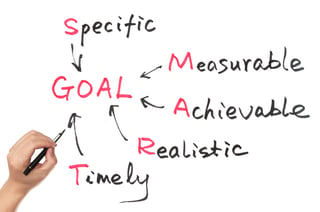Do you sales reps have written goals? Do your employees have written goals?
Goal setting is one of the most powerful tools and methodologies to improve engagement - engagement of sales people and engagement of employees. Billy Cox writes in the All Star Sales Book: Get in the Game, Boost Your Number and Earn the Big Bucks “Why do such a small percentage of people reach the elite performer status? Why do these top few make most of the money? And, how can you become one of them? Winning in sales is no different than winning in sports, business, and life. The next generation of salespeople may know how to close a sale, but most don't know how to effectively develop their mental aspects of the game. As a result they never make it to the top and they sit around wondering why others with less talent keep passing them by. In the game of sales, business, and life there are no time-outs, no overtimes. You only get one chance to play. The question you have to ask yourself is, ‘Do I want to wait on the sidelines or do I want to win?'"
Everyone thinks they want to win, but the key to really wanting to win is having goals: business and personal. Goals need to be clearly defined. The SMART acronym is useful: Specific, Measurable, Achievable, Realistic, Timely.
As a leader, helping people learn to set goals and also sharing your goals increases trust. Trust is key to increase employee performance as I wrote in my last blog.
To increase motivation, focus on activity and the results will come. For your sales people to increase their performance, set activity based goals that can have an impact on the selling results. Too many times goals are set for outcomes and not the necessary activities that will deliver the outcome. For instance, to increase closes, one must increase the number of quotes given. To increase quotes, the number of appointments must be increased or the needed skills to further define a prospect's needs, goals, or problems must be learned. Setting a goal related to increasing quotes by 15% over the next 60 days is a very measurable and timely goal. The next question is "Is this goal realistic for the sales rep?' It may be realistic for one rep, but not for another. That will depend on their selling skills, territory, etc.

With all goal setting, the person who must obtain the goal must believe they can. They may have to learn new skills, put forth extra effort, change an attitude, etc. The key is belief. If they don't believe they can, then they are right. The power of belief can change a person's world. Belief is based upon a person's mindset: growth or fixed. A growth mindset believes that to achieve the goal, greater effort must be applied and that they can learn. A fixed mindset sees the goal as an opportunity to be exposed as a failure and resists setting or working toward the goal. To learn more watch mindset videos, read the book Mindset: The New Psychology of Success by Carol Dweck, PhD and visit Carol Dweck's website.
One of the best engagement programs I have implemented is teaching people how to set goals and how to develop the steps to achieve them using Billy Cox's book. We began the program with first having people assess their business and personal situation and establish a goal that can be accomplished, with just a little stretch, in the next 30 days. That got them moving on something business related (a quick return on investment) and on their personal life. After 30 days, we started working on 90 day goals, both business and personal.
One client attributed their 29% growth to the whole goal setting process. The COO stated, "Although we had the strategic relationships established, internally and externally we were not prepared to take advantage of them until we went the the All Star Sales Book and then we "got in the game'."
If you can get people working not just on business goals, but on personal goals too, they will become more engaged. For they will see how the skills they are learning at work can benefit them personally. I had one sales rep tell me she had her daughter, who was failing in 9th grade, engage in the goal setting process with her. They set 30 day goals for school and achieved them. They then set 90 day goals and acheived them. The daughter was able to pull up her grades and passed.
Goals give purpose. People without a purpose lose motivation and direction. Having a personal purpose in the learning process gets greater buy-in. For sales, goals are a motivation to get up and get going each day. Create a contest where sales reps compete against each other and against themselves. A few suggestions are to set the benchmarks on top dollar, most revenue, and fastest growth.
Most people just go through life without a higher purpose. Be that great employer who helps your employees find their higher purpose in personal and business settings.
Goal setting is so effective and contagious. With one company, we started with 23 participants in a goal setting process. The talk among the employees in the department was so energetic that the staff requested to go through the program. When it was all done in 9 months, 60 people had gone through the goals program resulting in a sales increase, employees improving productivity, two people saving their jobs (attitude change), and one women going back to school to finish her college education.
If you don't have a formalized goals program, then you are missing on a great opportunity to improve engagement that reaps great rewards!

